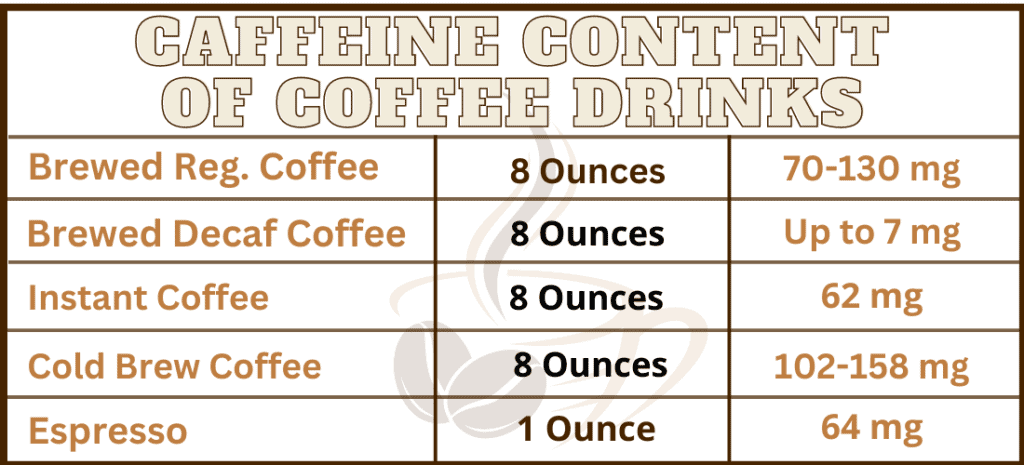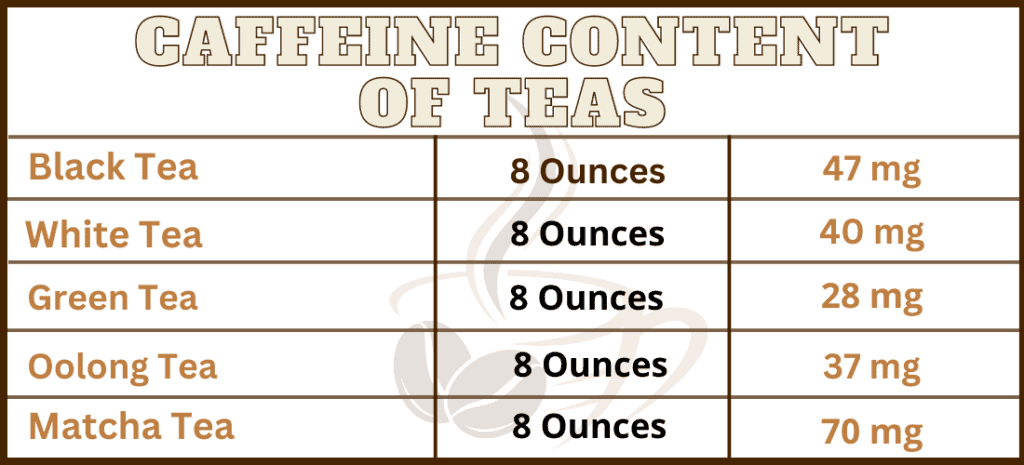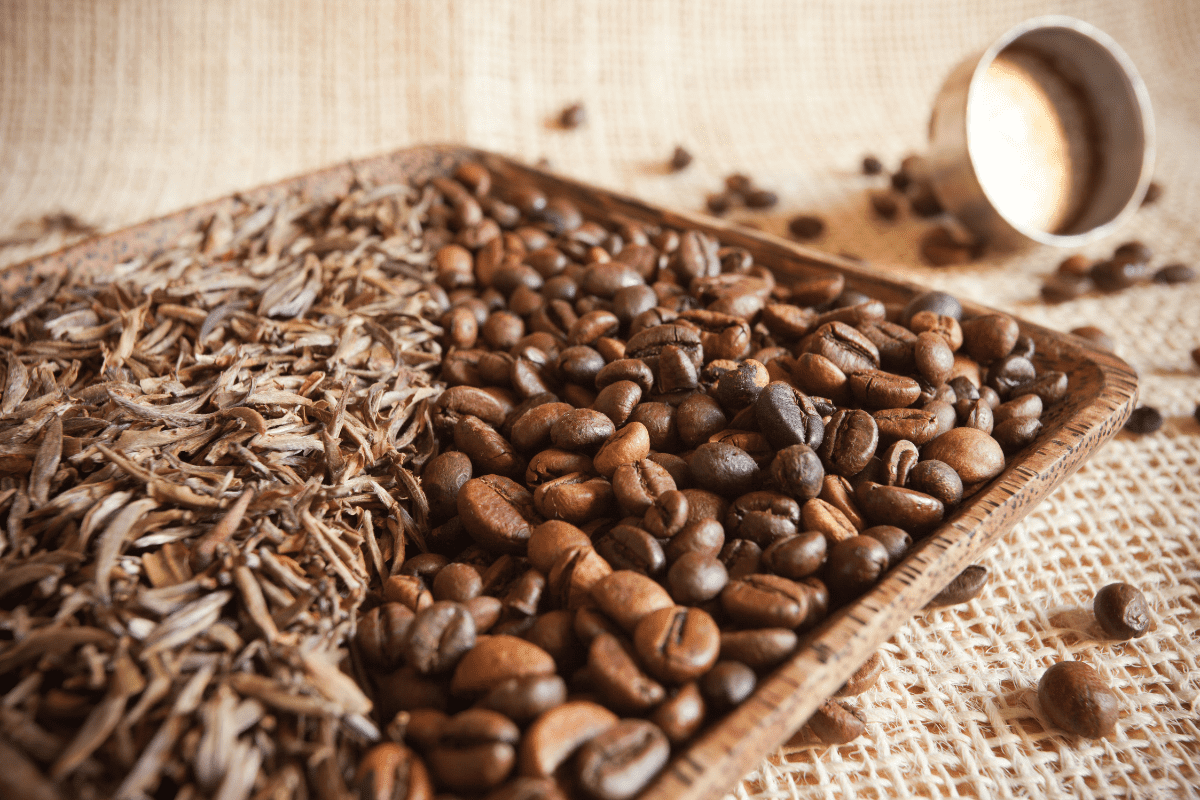Most of us rely on caffeine to help us through our long days. Likely, the first thing that comes to mind when you think of caffeine is coffee, but other beverages provide caffeine as well, like tea. If you’re looking for a little extra caffeine boost, you may wonder which has more; Coffee or Tea.
In almost all cases, coffee will have more milligrams of caffeine compared to the same size cup of tea. Keep in mind that some factors will affect the caffeine content, such as brew time and processing.
Let’s take a closer look at the caffeine content of various types of coffee and tea, so you can better understand what you consume each day.
Caffeine Content of Coffee and Tea
When comparing the caffeine content between coffee and tea, there isn’t one answer that fits all. The type of coffee and tea you are comparing can change the answer to this question. Although typically speaking, coffee will have higher caffeine levels when compared to most teas.
Take a look at the two tables below. The first is of various coffee drinks, and the next is some of the more common teas of tea drinkers. You can see that most of the coffees, besides decaffeinated coffee, contain more caffeine, except when you come to Matcha Tea, with about 70 mg of caffeine.
Matcha tea is bright green tea made from the youngest or newest tea leaves. As you’ll read more about later, these leaves are shielded from direct sunlight, which increases the amount of caffeine. Another reason this tea has such a high caffeine level is that the leaves are ground up and put in the tea, so you are consuming all the caffeine the leaves offer.
Other teas we’ll compare are black tea, white tea, green tea, and oolong tea.
Cold brew is a coffee drink that has high levels of caffeine. Cold brew coffee is brewed cold to create a smoother finished cup of coffee. It’s not the same as iced coffee though. The difference between cold brew and iced coffee is in the steeping time. Cold brew is steeped for at least 12 hours, which is why the caffeine content is so high.


What Can Affect the Caffeine Content in Coffee
The amount of caffeine in a regular eight-ounce coffee can differ depending on the coffee bean, the brewing method used, and how much coffee is used.
1. Type of Coffee Bean
Let’s first discuss coffee beans; Arabica and Robusta. If you’ve read some of our other articles, we always recommend purchasing and using 100% Arabica beans for their higher quality and smoother flavor.
But, if we are talking caffeine content, then Robusta coffee beans will have higher levels of caffeine than Arabica beans. Although Arabica beans are higher in acidity and are known for their sweeter tastes, they only have about half the caffeine content of Robusta beans.
2. Brewing Method
Generally, brewing methods that involve higher extraction levels will produce coffee with higher levels of caffeine. Such things as grind size, the water temperature, and the brewing device affect the extraction level.
Extraction is the process of pulling the flavor out of the coffee bean through hot water. When hot water is combined with coffee grounds, a chemical reaction dissolves the flavor compounds. It’s essential to learn exactly how long your coffee grounds need to be extracted to avoid unwanted flavors.
3. How Much Coffee is Being Used
The more coffee you use, the more caffeine you will get. So, if you use a single scoop when making one cup of coffee and a double scoop when making another cup of coffee, the coffee that was made with a double scoop will have more caffeine.
Contrary to popular belief, I want to note that the roast level does not indicate more or less caffeine. The truth is that most coffee beans contain about the same amount of caffeine, regardless of roast level. Let’s dig a bit further to understand why some say that lighter roasts offer more caffeine.
There is some basis for this theory. First, we’ll present you with some coffee facts.
- Dark roasted coffee beans are less dense and bigger in size.
- As beans are roasted, they lose moisture, become lighter, and expand and crack, becoming bigger.
Since light roasts have less moisture, they are smaller than darker roasts. This is why measuring coffee beans with a scale over a scoop is highly recommended. If using a scoop to measure coffee, the scoop can hold more light roast beans than a darker roast, thus making a cup of lightly roasted coffee contain more caffeine.
A single scoop of lightly roasted beans can have 60 mg of caffeine, while a single scoop of dark roasted beans will only have 55 mg. This is where the misconception comes from.
Using a coffee scale, you measure weight (mass), not volume. When weighing your beans, the caffeine content would be the same between light, medium, and dark roasts. Still unsure if a coffee scale is necessary? Click here to read more.
What Can Affect the Caffeine Content in Tea
A few factors determine the amount of caffeine you will have in your cup of tea. These include the type of tea plant you use, water temperature, and brew time.
1. Type of Tea Plant
There are two primary varieties of tea plants: Camellia Sinensis Sinensis and Camellia Sinensis Assamica. Even though there are thousands of different types of tea out there, all types of tea from the main categories, including black, dark, yellow, white, green, and oolong, are from the Cammellia Sinensis plant.
Another aspect that affects the caffeine content in tea plants is the amount of sun exposure they have when growing. A tea plant grown in a shaded or partially shaded area will contain more caffeine in its leaves. In addition, newer tea leaves (tips of the tea plant) typically have more caffeine than older leaves.
2. Water Temperature
As you notice in the table above, black tea contains more caffeine than green tea due to the variety of tea plant used. Also, black tea is brewed with boiling water, while green tea is typically brewed with a tad cooler water at 80 degrees Celsius. Both aspects affect the amount of caffeine in each type of tea.
3. Brew Time
Steeping your tea for longer will also increase the amount of caffeine. The longer the tea bag or leaves are in the water, the more time the hot water has to extract the caffeine out of them.
How Much Caffeine is Safe to Consume
According to 2020 data from the National Coffee Association, the average person in the United States drinks a little over three cups of coffee a day. Coffee consumption has risen between 2015 and 2020, increasing by a modest five percent.
Do you worry that maybe you’re overdoing it on the coffee? Federal guidelines state that between three and five cups of coffee, each being an 8-ounce cup, is safe for consumption. Your limit should be 400 milligrams daily, which is about four or five cups of coffee.
It’s important to remember that six ounces, not eight ounces, is the standard for coffee and hot beverages like it, such as cocoa and tea. The reason seems to be attributed to the metric system and the recommendation of health professionals. For further clarification, read “How many ounces are in a standard cup of coffee?”
NOTE: This guidance only applies to healthy adults, not adolescents, young adults, children, or pregnant women.
Physical Consequences of Drinking Too Much Caffeine
- Muscle Tremors: Some people call these caffeine jitters, but they’re anything but a minor nuisance to brush off. Adrenaline and other hormones spike when caffeine enters your body, which is where the jitteriness comes from.
- Fast Heartbeat: Epinephrine in your blood increases. Epinephrine or adrenaline will raise your heart rate. It’s more than that, though. Your heart’s force of contractility raises, as well as your blood pressure.
- Insomnia/Restlessness: Your body often needs 10 hours to pass the caffeine through your system. Until that happens, you may be tossing and turning and experiencing sleeplessness.
- Moodiness: The energy from caffeine makes you feel less grumpy at first, but these effects are short-lived. You can become quite irritable as the caffeine travels through your system, especially if you drink a lot of coffee daily. You’re likely going through caffeine withdrawal, which can also come with headaches.
- Increased Urination: You might attribute your increased urination to drinking so much coffee. That’s part of it, but not the whole story. Caffeine is a diuretic, a substance that makes you have to urinate more often.
- Upset Stomach: This is a symptom that a lot of people report. It’s not the coffee itself, per se, but the caffeine in it. Caffeine affects the digestive tract as it passes through, often leading to distress and irritation. Your digestive tract can even contract or move, hence the stomach pain. In some cases, if you overdo it on the caffeine, the stuff could behave like a laxative, which will send you running to the bathroom.
- Dizziness: As caffeine changes how much blood reaches the heart, it does the same to your brain. With less blood flow in the brain, you can feel a little woozy for a while. The feeling will pass, but it can take time.
- Anxiety: When drinking too much caffeine, your fight or flight response activates due to increased adrenaline. If you have anxiety, then your symptoms can worsen after having caffeine.
If you are having some of the issues listed above, you may want to consider reducing your caffeine intake. It’s always a good idea to speak with your doctor to ensure there aren’t any other medical issues that need to be taken care of.
For steps on how to safely reduce your caffeine intake, click here.
Health Benefits of Drinking Coffee and Tea
Drinking tea daily can help improve alertness and cognitive performance without some of the downfalls of coffee. Since tea leaves and coffee beans come from plants, they are great sources of polyphenols.
Polyphenols can..
- decrease the risk of chronic diseases
- Improve good bacteria for gut health
Coffee
- Lowers the risk of cancer and diabetes
- Lowers risk to heart disease
- Supports brain health
- Improves energy levels
Tea
- Beneficial to your blood pressure
- Lowers cholesterol
- Decreases stress levels
- Improves mental health
Final Thoughts
As you can see, coffee will generally have more caffeine than tea. So if you want to increase your caffeine intake, go for the coffee and if you are trying to limit your caffeine, go for the tea.
